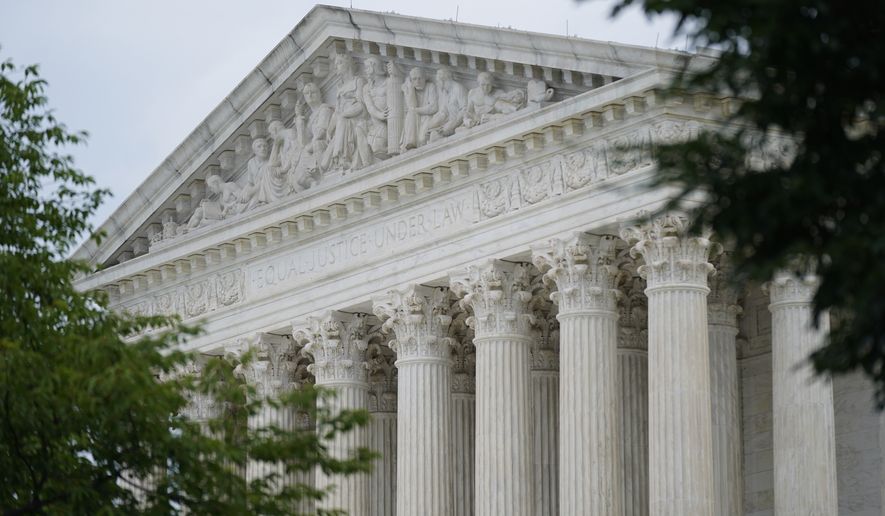The Supreme Court’s most recent rulings have prompted states to change policies on issues such as abortion, gun rights and religious liberty — but not all of those results have been welcomed by conservatives.
The justices, for example, ruled in June that Maine can’t exclude religious schools from its tuition reimbursement program, which provides education paths for children in rural towns without a public school.
But only one religious high school will participate in the program this fall. Maine’s attorney general said schools that receive state funds will have to abide by the state’s anti-discrimination laws, which could mean welcoming LGBTQ employees and students, The Associated Press reported.
Some of the families who had filed the federal lawsuit expressed disappointment over the state’s move.
“Their hands are tied. The state said you can take the money, but we’ll tie your hands,” said David Carson, who sued in 2018 on behalf of his daughter, who was in high school at the time.
Rick Manning, president of Americans for Limited Government, said the religious schools are likely skeptical of partaking in the program.
“The history of benign faith partnerships using government grants have caused faith-based groups to be very reluctant to subject themselves to taxpayer funding and the inevitable strings and pressures to conform their beliefs to government restrictions,” Mr. Manning said.
Guns in New York
In June, the Supreme Court struck down the state of New York’s requirement that individuals requesting a concealed firearm carry permit must show a proper need to obtain one.
But state officials have enacted a new law again aimed at curtailing the carrying of a firearm in New York. Legislators passed the Concealed Carry Improvement Act on July 1 — just days after the high court had struck down the state’s prior licensing scheme on June 23.
In New York State Rifle & Pistol Association, Inc. v. Bruen, the high court’s conservative majority ruled that the state’s law was too subjective and ran afoul of the Second Amendment.
Following the decision, the Empire State saw a 54% increase in permit applications, The New York Times reported.
New York’s new law, however, also imposes restrictions on gun ownership.
It requires individuals to show good moral character, present character witnesses and provide links to their social media accounts for review when applying.
It also details a long list of sensitive places where carrying a firearm would be unlawful, sparking gun rights activists to say it effectively makes it almost impossible to legally carry a firearm anywhere in the state despite getting a license.
Pro-gun groups have challenged the legislation, citing the Supreme Court’s decision in Bruen. The new permitting law, though, took effect this month.
Abortion in Texas, Mississippi
The high court’s majority delivered a victory for conservatives this past term for their pro-life cause, upholding Texas’ law limiting abortions after a fetal heartbeat is detected.
But critics argue that women are still getting abortions, they’re just traveling out of state.
According to a University of Texas study, more than 5,500 women got out-of-state abortions during three months following the implementation of the law upheld in 2021.
SB 8 went into effect last September after the high court refused to block it following a legal challenge by abortion providers.
The legislation makes it unlawful for someone to facilitate an abortion past a fetal heartbeat having been heard, which is usually around six to eight weeks of pregnancy. A citizen — not the state — can sue anyone who performs or helps a woman have the procedure.
As a result of the law, the abortion rate in Texas did decrease by roughly 50% in the month after SB 8 went into effect.
Texas Attorney General Ken Paxton estimated in February that the rate was even higher, saying abortions fell by 60% and that the law has resulted in roughly 17,000 newborns, according to his calculations.
“Simply by having SB 8 enacted, thousands of lives have already been saved in Texas. Stopping abortion providers from conducting these barbaric practices is yet another win for our great state,” the Republican said.
The high court delivered another pro-life win, in Dobbs v. Jackson Women’s Health Organization. The court upheld Mississippi’s 15-week ban on abortion — and went further to overturn Roe v. Wade, the 1973 case that guaranteed the right to abortion nationally.
The ruling sent the matter back to state legislatures to implement laws either protecting or restricting the procedure. Many Republican-controlled states moved immediately after the ruling to outright ban abortion with few exceptions.
However, the overall impact on abortion nationwide from the Dobbs ruling, issued in June, is not yet known, according to a spokesperson from the Centers for Disease Control and Prevention, who said data related to abortions for 2022 won’t be available for about two years.
More state control
Adam Feldman, creator of the Empirical SCOTUS blog, said the trend in rulings from the justices suggests that states have the ability to create increasingly broad laws.
“Policies are moving in a more conservative direction, but that is being driven by state laws,” Mr. Feldman said. ”States have more discretion in making the policy.”
Elliot Mincberg, senior fellow at People for the American Way, said that is not too surprising, given state legislatures are mostly controlled by Republicans — but he noted state constitutions and entities generally have the final say.
“Most Supreme Court cases and decisions are not self-executing. They depend on people and also on state and other entities taking action and that is what becomes — sometimes, depending on your point of view — a problem,” Mr. Mincberg said.
• This article is based in part on wire service reports.
• Alex Swoyer can be reached at aswoyer@washingtontimes.com.




Please read our comment policy before commenting.